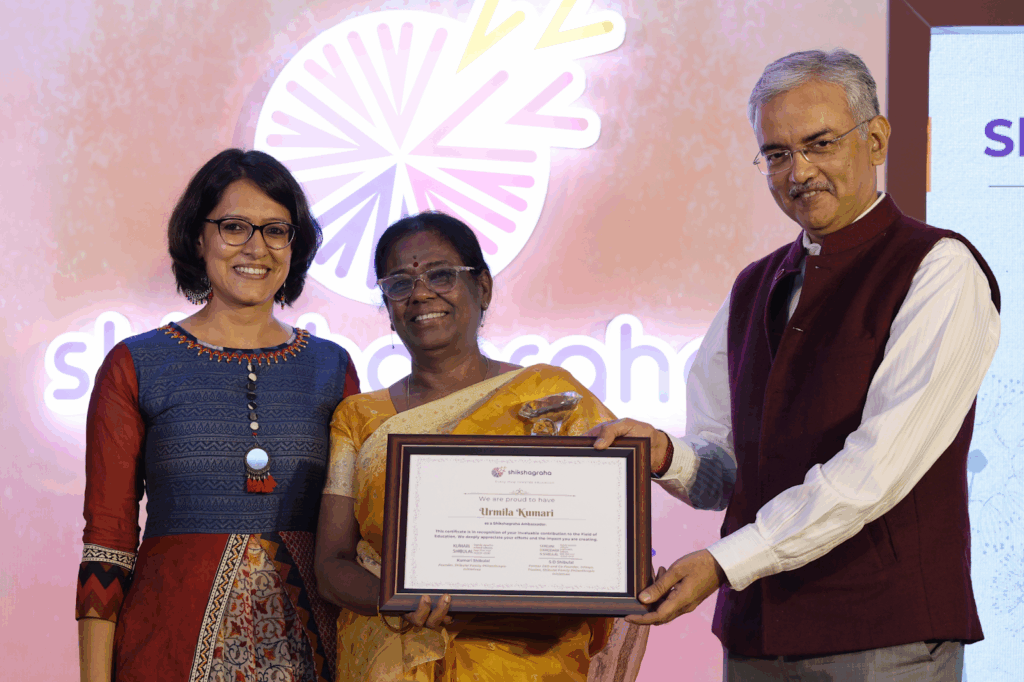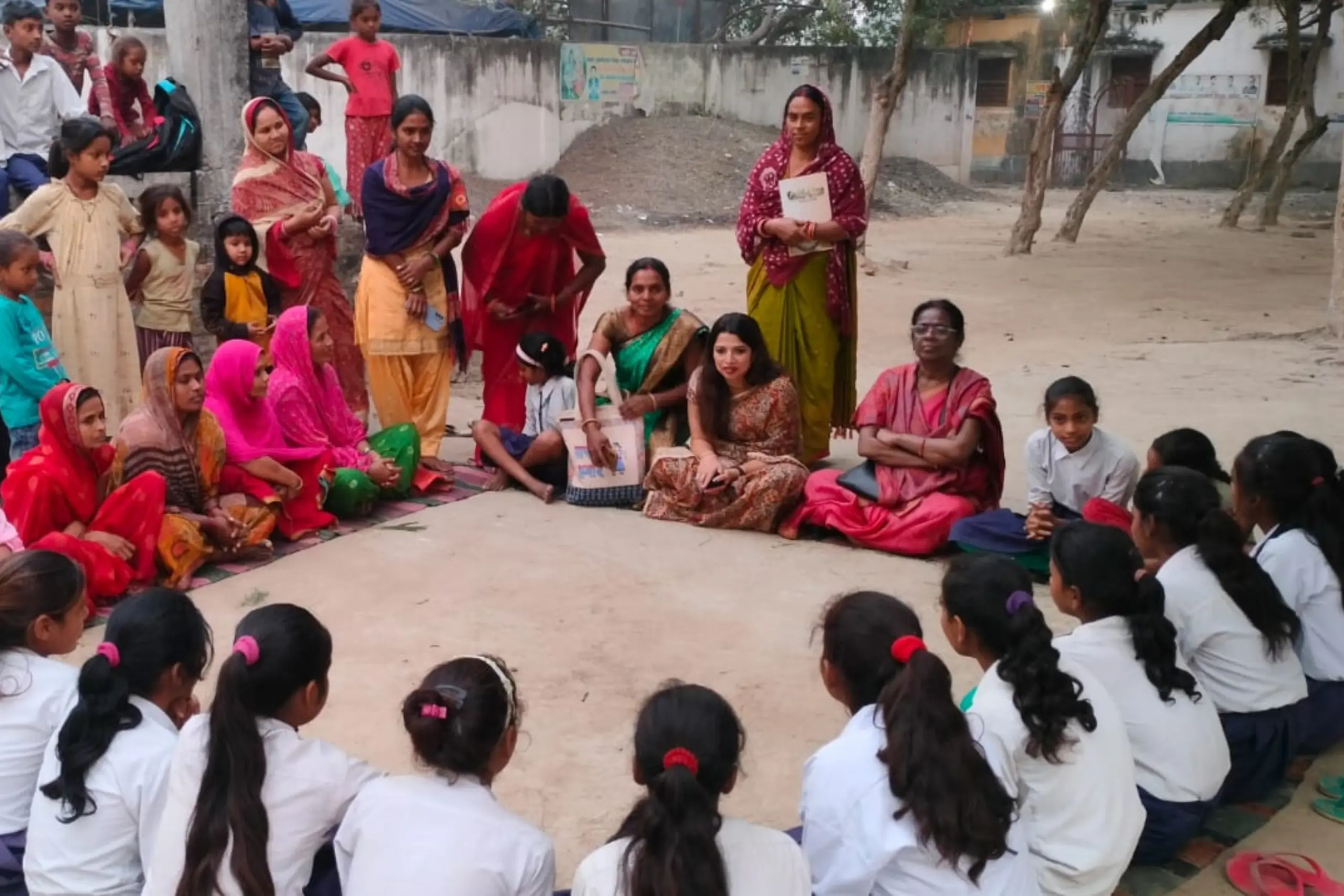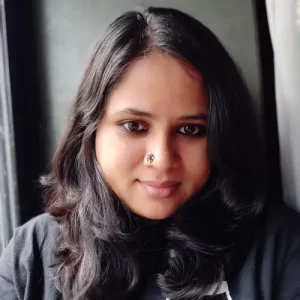
Urmila didi, being recognised as a Shikshagraha Ambassador at Shiksha Samvaad
Fondly known as Urmila Didi, she carries with her a spirit of resistance and hard-earned wisdom. From her early days with the Mahila Samakhya programme (a women’s empowerment and education initiative launched by the Indian government in 1988) to nearly three decades of grassroots experience in Bihar’s education movement, Urmila Didi has seen the education landscape shift—slowly, unevenly, but surely—through the persistence of women, much like her. And today, with Shikshagraha, when she walks into a Shiksha Chaupal (a community-led dialogue to mobilise women around the urgency of continued education for both girls and boys) she is not just a facilitator, but a quiet force that is steering the movement forward in the state.
This is the story of Urmila Kumari.
Against All Odds: A Childhood of Defiance
Urmila Didi’s journey as an education leader begins long before her professional journey. She grew up in a neighbourhood in Bihar, where education, especially for girls, was unheard of.
Despite the prevailing patriarchy, her father believed strongly in equal education. “No one studied there,” she says. “But my father was different. He was a freedom fighter, as was my grandfather. Whether a boy or girl, they’ll study as much as they want, he insisted.”
And they did. Urmila Didi and her two sisters ended up studying more than their four brothers. Urmila Didi went on to get a master’s degree. The youngest sibling, she remembers her neighbours’ constant whispers: “Ladkiyon ko padhai se kya faayda?!” (What is the point of girls continuing their studies?!) Her family ignored everyone. Even her eldest sister, who got married early, later studied law. “We didn’t let societal rules bind us,” Urmila Didi says. “We studied. We played. And we dreamed.”
The spirit of resistance and purpose, deep in her family and rooted in her, led Urmila Didi to education as a calling. Whenever she was asked why she wanted to join the Mahila Samakhya programme, she replied, simply: “Because I want to empower women—and if I can earn a salary while doing that, even better.”
Mahila Shikshan Kendra: A literacy revolution
With the Mahila Samakhya programme, Urmila Didi taught in the Mahila Shikshan Kendra (Women’s Education Centre), and ran literacy camps for women. The Mahila Shikshan Kendra took in 35–40 girls and women (aged between 14–24) who had dropped out or never gone to school, and taught them the Grade 5 curriculum for nine months. They didn’t just learn the alphabet—they gained a voice. “We trained them to sit for Grade 5 exams. Many thought they were ‘too old’ to continue beyond that. So we brought the school to them, creating learning spaces where they could continue their education without feeling out of place.”
In literacy camps, women up to the age of 40 were taught to read and write so that they could sign their names instead of using thumbprints.
“Most of them were deeply attached to their domestic lives. So we started from there—make your home and family your starting point to learn.” Women who had never been to school were asked to write the words “ghar parivar” (home and family) in Hindi.
In the Kendra, they created a learning ecosystem with colour-coded categories to measure learning and progress. This would encourage girls to work hard to move up the colour ladder. “Eventually, even 35- and 40-year-old women prepared for board exams,” she says. “They started believing, we too can do it.”
“It wasn’t just about education, but it was about emancipation. They played football. Learnt karate. Celebrated festivals of all religions. Sang songs that challenged social norms. We used to say, ‘Padho likho, Jhansi ki Rani bano!’ (Read and write, become the Queen of Jhansi!)” She laughs. Her activism was rooted in a quiet yet deep outrage towards injustice—especially gender-based violence. “Reading about customs like jauhar or widows having their heads shaved… it would infuriate me.”
Urmila didi, leading a discussion on girls’ education
Continuing the fight: Urmila Didi’s evolving journey in women’s education
When Mahila Samakhya eventually shut down (because it was deemed a “small budget program” by the state government), Urmila Didi found herself without a job but not without purpose. Her M.Ed. qualification, which she had earned alongside her grassroots work, now became her pathway forward. “That’s when my M.Ed. came to use,” she reflects. “I needed work, and universities required a master’s degree to teach bachelor’s students.” She brought her field experience into academic spaces. There were opportunities to influence the youngsters and their mindsets even there. “Sometimes, I found the need to counsel the teachers—especially those who upheld patriarchal ideas in the classroom.”
Today, Urmila Didi is a pivotal force in Shiksha Chaupal. She doesn’t just manage all the interactions and coordinate with community-based organisations in Bihar. She brings them all together, turning isolated efforts into a people’s movement. When she plans activities for Meena Manch (a UNICEF program for adolescent girls’ education), she mobilises entire communities to take steps towards education equity. Her real strength is her ability to nurture leadership in other women, multiplying her impact village by village. Under her guidance, scattered initiatives have transformed into a movement across Bihar’s communities.
In 2024, in 172 villages across Bihar, over 68,000 individuals pledged to send their daughters to school till Grade 12 and not get them married before that. Urmila Didi helped co-create the oath formats—mothers and daughters committing together, to stay in school and avoid child marriage.
In one village, the impact was immediate: a girl’s marriage was delayed after she reminded her parents of the promise they had made. “That’s what we are trying to do, and this incident was a reflection that the shift has started”, she proudly shares.
Urmila didi, interacting with women at the recent Shiksha Chaupal in Bihar
She also played a central role in helping grassroots women become tech-savvy, introducing them to digital tools that amplified their voices and stories. This digital empowerment was crucial because many women from this area had never used smartphones before and needed these tools to access information, communicate beyond their immediate communities, and document their own experiences. Urmila Didi found a way. “We grouped them, taught them, and built confidence. An older woman said, “Didi, I feel proud, I can use WhatsApp now.” They came up with their own slogan: “Hum khush hain, hum seekh liye!” (We are happy, we have learnt to use [our phones]!)
Her journey of enabling women doesn’t stop here. She knows the Bihar state has a long way to go. But Urmilla didi and her group of changemakers are ready to take on new challenges every day. From focussing on drop outs, to bridging digital literacy gaps to addressing drug abuse issues, Urmila Didi continues to adapt. “In the next Chaupal, we’ll include boys. They need to be brought in as allies. We’ll show them positive examples of women who broke barriers from their own villages.”
Urmila didi, speaking to a group of girls about the importance of education
Urmila Didi’s leadership isn’t performative. It’s grounded in her own journey from a defiant girl who refused to be silenced, to a woman who has vowed to transform communities. Whether she’s orchestrating village-wide pledges with local organisations or standing beside a single mother advocating for her daughter’s education, she brings the credibility of someone who has walked this path herself.
“Education and women’s empowerment are close to my heart,” she says. “I’ve lived it, fought for it, and I’ll continue to make more women join this journey.”

